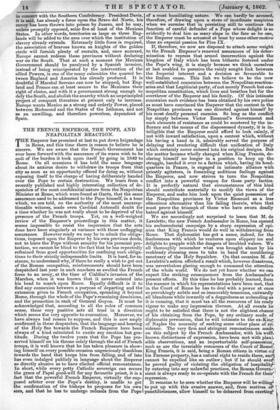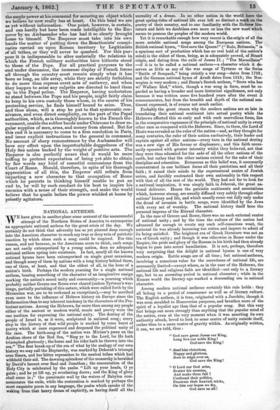THE FRENCH EMPEROR, THE POPE, AND NEAPOLITAN REACTION.
THE Emperor has promised at last to put down brigandage in Rome, and this time there is reason to believe he is sincere. We are aware that the French Government has ever been forward with the assurance of its warm wish to be quit of the burden it took upon itself by going in 1849 to Rome. On all occasions it has held the same language about its anxious desire to withdraw- its troops from that city as soon as an opportunity offered for doing so, without exposing itself to the charge of having deliberately handed over the Pope to certain destruction. We learn from a recently published and highly interesting collection of de- spatches of the most confidential nature from the Neapolitan Minister at Rome, which were found at Gaeta, that the same assurance used to be addressed to the Pope himself, in a tone which, we are told, on the authority of the most unexcep- tionable witness, made even Cardinal Antonelli doubt for a time whether he was not really about to be deprived of the presence of the French troops. Yet, on a well-weighed review of the Emperor's proceedings in this matter, it seems impossible to resist the impression that the acts done have been singularly at variance with these unflagging assurances. However ready we may be to admit the obliga- tions, imposed upon the Emperor by his own previous deeds, not to leave the Pope without security for his personal pro- tection, we cannot be blind to the fact that he has repeatedly refrained from good opportunities for confining such obliga- tions to their strictly indispensable limits. It is hard, for in- stance, to understand why, if there be really a wish to get out of the Roman occupation, reinforcements should have been despatched last year in such numbers as swelled the French force to an army, at the time of Cialdini's invasion of the Marches, when it was known that it never entered into his head to march upon Rome. Equally difficult is it to find any connexion between a purpose of departing and the extension given to French occupation, spreading it beyond Rome, through the whole of the Pope's remaining dominions, and the promotion in rank of General Goyon. It must be acknowledged that, according to all the rules of common sense, these very positive acts all tend in a direction which seems the very opposite to evacuation. Moreover, we have always had reason to suppose, and this is now amply confirmed in these despatches, that the language and bearing of the Holy See towards the French Emperor have been always of a kind calculated to excite any emotion but gra- titude. During the twelve years that the Pope has pre- served himself on his throne solely through the aid of French troops, it is well known that he has taken pleasure in show- ing himself on every possible occasion ungraciously thankless trwards the hand that keeps him from falling, and of late has even indulged publicly in language about the Emperor so directly abusive as to have elicited official remonstrance. In short, while every petty- Catholic sovereign can secure the grace of Papal good-will for any favourite priest, it is a fact that the powerful French Emperor, virtually the sup- posed arbiter over the Pope's destiny, is unable to get the confirmation of the bishops he proposes for his own sees, and that he has to undergo refusals from the Pope of a most humiliating nature. We can hardly be accused, therefore, of drawing upon a store of inordinate suspicion when we surmise that in persisting still to continue the function of careful defender of a Pope whose delight is so evidently to deal him as many slaps in the face as he can, the Emperor must be actuated at least by some other motive than an especial passion for Pius IX.
If, therefore, we now are disposed to attach some weight to the French Emperor's renewed assurances of his deter- mination to repress that armed insurrection againirt the kingdom of Italy which has been hitherto fostered under the Pope's wing, it is simply because we think ourselves at last enabled to perceive the vainly sought link between the Imperial interest and a decision so favourable to the Italian cause. This link we believe to be the now well-established connexion between the Neapolitan reaction- aries and that Legitimist party, of not merely French but cos- mopolitan constitution, which lives and breathes but for the overthrow of the Emperor and his family. Of this intimate connexion such evidence has been obtained by his own police as must have convinced the Emperor that the contest in the Neapolitan provinces was one directed against himself by his most deadly personal enemies. So long as the conflict lay simply between Victor Emanuel's Government and such elements of resistance as could be mustered by the in- fluence and the means of the dispossessed dynasty, it is in- telligible that the Emperor could afford to look calmly, if not with inward satisfaction, upon a contest which, without his having a hand in it, admirably served the purpose of delaying and rendering difficult that unification of Italy which certainly never entered into his original designs. But the matter became wholly changed when King Francis, de- claring himself no longer in a position to keep up the struggle, handed it over to a faction which, having its head- quarters in France, is engaged in intimate alliance with priestly agitators, in fomenting seditious feelings against the Emperor, and now strives to turn the Neapolitan conflict into a powerful weapon for these party tactics. It is perfectly natural that circumstances of this kind should contribute materially to modify the views of the Emperor, and make him look upon the quiet possession of the Neapolitan provinces by Victor Emanuel as a less obnoxious alternative than his failing therein, when that must prove the triumph of those who have sworn deadly hatred against himself.
We are accordingly not surprised to learn that M. de Lavalette, the new French Ambassador in Rome, has opened his ambassadorial campaign by a sharp expression of opi- nion that King Francis would do well in withdrawing from Rome. That diplomatist has got a name, indeed, for the fearlessness with which he ventures upon slippery ice and delights to grapple with the dangers of troubled waters. We all thoroughly remember what was brought about by his recklessly choosing once to take in hand the mouldering sanctuary of the Holy Sepulchre. On that occasion M. de Lavalette's action effected a result which, however disastrous, was nevertheless glaring enough to command the attention of the whole world. We do not yet know whether we can expect like striking consequences from the Ambassador's present efforts. By this time he has probably learned, from the manner in which his representations have been met, that in the Court of Rome he has to deal with a.power at once so provokingly subtle and so immovably tenacious, outwardly all blandness while inwardly of a doggedness as unbending as it is cunning, that it must tax all the resources of his ready vigour to make any impression thereon. At all events he ought to be satisfied that there is not the slightest chance of his obtaining from the Pope, by any ordinary mode of diplomatic persuasion, that he will intimate to the ex-King of Naples the necessity of seeking some other place of ret. sidence. The very firm and stringent remonstrances mado) on this subject by the French Ambassador, with his well'. known distinctness of expression, have been met with plant- sible observations, and an imperturbable self-possession, , such as are the invariable resources of the Court of Rom4. King Francis, it is said, being a Roman citizen in virtue o f his Farnese property, has a natural right to reside there, an cannot be expelled like an outlaw ; but if he should eve be proved guilty of violating the obligation of hospitalityL by entering into any unlawful practices, the Roman Govern-'1 went is always ready to co-operate with the French for their' ' repression. It remains to be seen whether the Emperor will be willing' to put up with this evasive answer, and, from motives oP punctiliousness, allow himself to be debarred from endings the ample power at his command for securing an object which we believe he now really has at heart. On this head we are as yet without information. One point, however, is certain, and can hardly but have been made intelligible to the Em- peror by an Ambassador who has had it so clearly brought home to himself. The Emperor must take into his own hands the matter of putting down the Reactionists' conspi- racies carried on upon Roman territory by Legitimists of all tribes, or they will never be quashed. For this pur- pose it is indispensable to alter materially the relations in -whiCh the French military authorities have hitherto stood to those of the Pope. For all practical purposes to the (end under discussion, the immense display of French forces all through the country must remain simply what it has 'been so long, an idle array, while they are strictly forbidden to do more than repress overt acts of outlawry, and when they happen to seize any culprits are directed to hand them up to the Papal police. The Emperor, having undertaken to stand between the Pope and his people, might fairly claim to keep in his own custody those whom, in the course of his protecting service, he finds himself bound to seize. Thus, and thus alone, will a stop be put to that systematic con- nivance, and even direct complicity, on the part of the Papal authorities, which, as is thoroughly known to the French Go- vernment, enable the robber bands under Chiavone to draw re- gular supplies of men, arms, and money from abroad. But for this end it is necessary to come to a firm resolution in Paris, and issue explicit instructions to the general in command. No amount of sharp remonstrance by the Ambassador will have any effect upon the imperturbable doggedness of the Holy See unless backed by the weight of positive acts. The Emperor is also perfectly aware that it would be mere trifling to pretend expectation of being yet able to obtain by fair words any kind of essential concessions from the Court of Rome. Should, therefore, in spite of his thorough appreciation of all this, the Emperor still refrain from imparting a new character to that occupation of Rome which he persists in thinking himself unable to put an end to, he will by such conduct do his best to inspire his enemies with a sense of their strength, and make the world believe that he quails before the power wielded at home by priestly agitators.



































 Previous page
Previous page